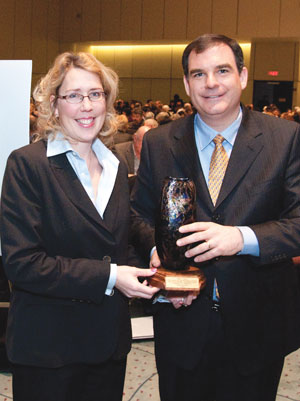Organizers of the Ontario Bar Association Institute conference say a weaker economy had little impact on attendance at last week’s continuing education conference, reporting only a 12 per cent drop in attendance.

“We’re delighted, and I’ll say somewhat relieved, because there were early concerns with the state of the economy,” says Heather McGee, who is the incoming chairwoman for the OBA’s Institute committee.
“Once again, the excellence of the programming and the profession’s commitment to excellence held through, and our numbers were actually comparable to last year,” she says.
There were 1,300 registrants, 17 programs, and 275 speakers at the conference, says McGee. And, despite the current economic woes, that represents a “very minor reduction” in registrants from last year, she says.
“By and large, people come for the programming,” says McGee in explaining the larger than expected turnout. “The panels are excellent, the materials are relied upon by practitioners, and there just seemed to be a spark this year as well with the programming direction of bringing in professional speakers and international approaches.”
There was extra buzz this year from attendees, says McGee, over the OBA’s first-time offering of a comprehensive CD packed with all the materials from each session in the conference.
“So no matter what program you signed up for, you had all the materials,” she says. “People are raving about that opportunity because you’re getting the best minds, not only in Ontario, but in some respects in the legal profession internationally.”
A few new programs also were offered at this year’s conference - education law, construction law, and insolvency. The latter was planned well before the economic downturn drew a greater volume of work to that area of the law, notes McGee.
“This was a program that was brought forward in May,” she says. “Goodness, talk about the timing of it. So that was a sold-out program.”
With next year marking the event’s 35th anniversary, McGee says the Institute committee is planning on “even bigger programming.”
“We’re looking for innovative ways of delivering what our members and what the profession need,” she says. “We’re hoping to maintain our core of excellent CLE programming, but bring more to the table - skills, training, opportunities to network, to develop best practices from different jurisdictions.”
McGee says her committee is determined to continue enhancing the event.
“We don’t want to rest on our laurels,” she says. “We’re already the largest CLE program in Canada, and we’ve got a tremendous staff working here, a core of staff that is enviable.”
She notes that the OBA is continuing its consultation on programming initiatives, and asks lawyers with ideas to contact the OBA’s director of professional development, Shem Singh, at
[email protected].
Meanwhile, the OBA handed out a pair of awards at Monday’s Institute luncheon.
Ontario Court of Appeal Justice Robert Sharpe was awarded the Mundell Medal, which goes to individuals who have made a distinguished contribution to the law in legal writing.
The award, first bestowed in 1986, is named after David Mundell, a top constitutional lawyer and first director of the Ministry of the Attorney General’s Constitutional Law Branch.
Marc McAree, counsel with Willms & Shier Environmental Lawyers LLP and chairman of the OBA’s environmental law section from 2006 to 2008, received the Linda Adlam Manning award for volunteerism.
It honours a member of the association who has advanced the OBA’s membership and demonstrated the role of the province’s legal profession through an accomplishment over the past year.

 “We’re delighted, and I’ll say somewhat relieved, because there were early concerns with the state of the economy,” says Heather McGee, who is the incoming chairwoman for the OBA’s Institute committee.
“We’re delighted, and I’ll say somewhat relieved, because there were early concerns with the state of the economy,” says Heather McGee, who is the incoming chairwoman for the OBA’s Institute committee.